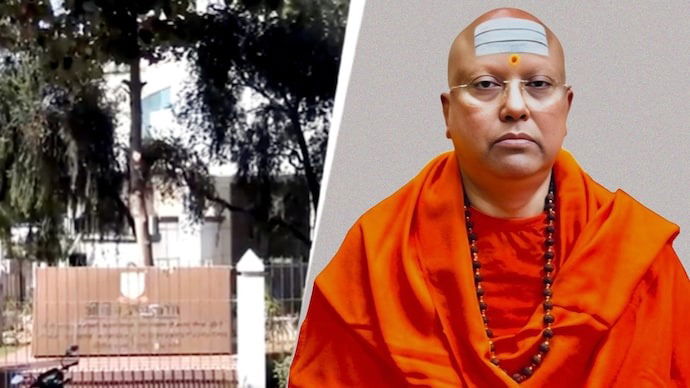
A shocking case of sexual harassment has emerged from a prominent management institute in Delhi. Female students at the Shri Sharda Institute of Indian Management-Research have accused the institute’s director, Swami Chaitanyanand Saraswati, of sexual harassment and misconduct. Swami Chaitanyanand Saraswati, known for his distinctive appearance with saffron robes, Rudraksha beads, and the tripund on his forehead, is now at the center of these serious allegations. The accusations have stunned the public, as they involve a man who presents himself as a spiritual leader, but whose actions have now tarnished the image of the educational institution.
Allegations from Female Students at Shri Sharda Institute
The students of the institute have claimed that Swami Chaitanyanand Saraswati, who was regarded as a spiritual figure and addressed as ‘Swamiji’ by the students, used his position to exploit them. Seventeen students have come forward with serious accusations, including inappropriate language, sending obscene messages, and physical assault. According to the students, the man who posed as a spiritual guru behaved like a predator, using his influence to harass the young women. The reports suggest that these students, many of whom were from economically weaker sections (EWS), were particularly vulnerable to his advances.
Secret Camera Surveillance
One of the most disturbing aspects of this case is the revelation that Swami Chaitanyanand Saraswati allegedly used secret cameras to keep an eye on the female students. According to sources, the students targeted by the accused were from financially weaker backgrounds and had enrolled in the Post Graduate Diploma in Management (PGDM) course under the EWS scholarship. It is reported that Swami Chaitanyanand Saraswati used various forms of coercion and manipulation to exploit these students, including threatening them with academic consequences if they did not comply with his demands.
Threats and Coercion
The female students have claimed that the accused used threats to force them into sexual acts. They revealed that Swami Chaitanyanand Saraswati sent explicit messages and made inappropriate proposals to them. He allegedly pressured them to engage in physical relationships and threatened them with serious repercussions, including academic penalties, if they refused. The students also reported that three female wardens from the institute worked in collusion with the accused, helping him delete evidence of these interactions from their phones, including chat histories and messages.
Offers to Lure the Students
In a particularly disturbing revelation, one of the female students shared a screenshot of a conversation with the accused. In the chat, Swami Chaitanyanand Saraswati allegedly offered the student a trip abroad and promised to cover all expenses if she came to his room. This kind of offer, combined with threats of academic failure, appears to have been a tactic used by the accused to control and manipulate vulnerable students into submission.
WhatsApp Chats and Student Complaints
The issue came to light in August when 17 students filed a formal complaint at the Defence Colony Police Station. This led to the discovery of WhatsApp chats involving nearly 50 students of the institute. The conversations revealed that the students had been subjected to continuous harassment. The police have already taken statements from three wardens who were reportedly complicit in assisting the accused by deleting explicit messages from the students’ phones. These revelations have sparked outrage, leading to investigations into the role of the wardens and the extent of the director’s manipulation of his position.
Swami Chaitanyanand’s Whereabouts and Past Allegations
When the case came to light, Swami Chaitanyanand Saraswati was reported to be in London, but his last known location was traced to Agra. He later filed for anticipatory bail in the Delhi High Court, but soon withdrew his application. Since then, he has gone into hiding, evading the authorities. This is not the first time Swami Chaitanyanand Saraswati has been accused of sexual crimes. According to Delhi Police, he has been previously charged with sexual assault in two separate cases, one in 2009 and another in 2016. The first case was filed in the Defence Colony area, while the second case was registered in Vasant Kunj North.
The Impact on the Institution and Calls for Accountability
The allegations against Swami Chaitanyanand Saraswati have raised serious concerns about the safety and well-being of students in educational institutions. This incident serves as a grim reminder of the need for greater scrutiny and accountability in institutions that are meant to educate and protect young minds. The students who have come forward with their allegations have shown immense courage, and their testimonies have put a spotlight on the dark side of those who hold positions of power in educational settings.
The management and staff of Shri Sharda Institute of Indian Management-Research are under intense scrutiny as the investigation continues. It is crucial for the institute to take appropriate action against the accused and ensure that proper mechanisms are in place to prevent such incidents in the future. The case has not only shattered the trust of the students but also raised questions about the integrity of the institute’s leadership.
The sexual harassment allegations against Swami Chaitanyanand Saraswati have sent shockwaves across Delhi. The involvement of a figure who presents himself as a spiritual leader and an academic professional has created a sense of disbelief and outrage. The victims’ bravery in coming forward with their stories has sparked a necessary conversation about abuse of power and the importance of safeguarding students from exploitation.
As the investigation into the case progresses, it remains to be seen how the legal system will address these serious charges. What is clear, however, is that institutions of higher learning must do more to ensure the safety of their students and take immediate, decisive action when such grave allegations arise. The public and legal scrutiny surrounding this case will likely lead to further discussions about how educational and religious institutions can prevent such misconduct in the future and better protect vulnerable individuals.


